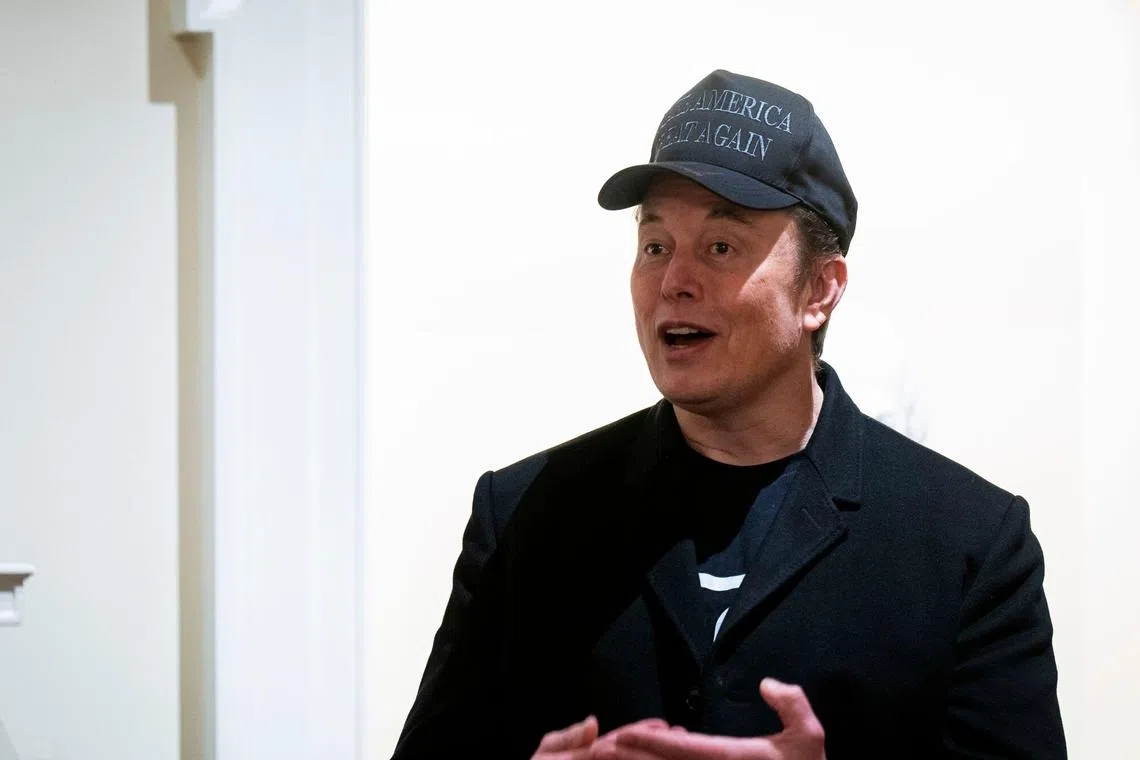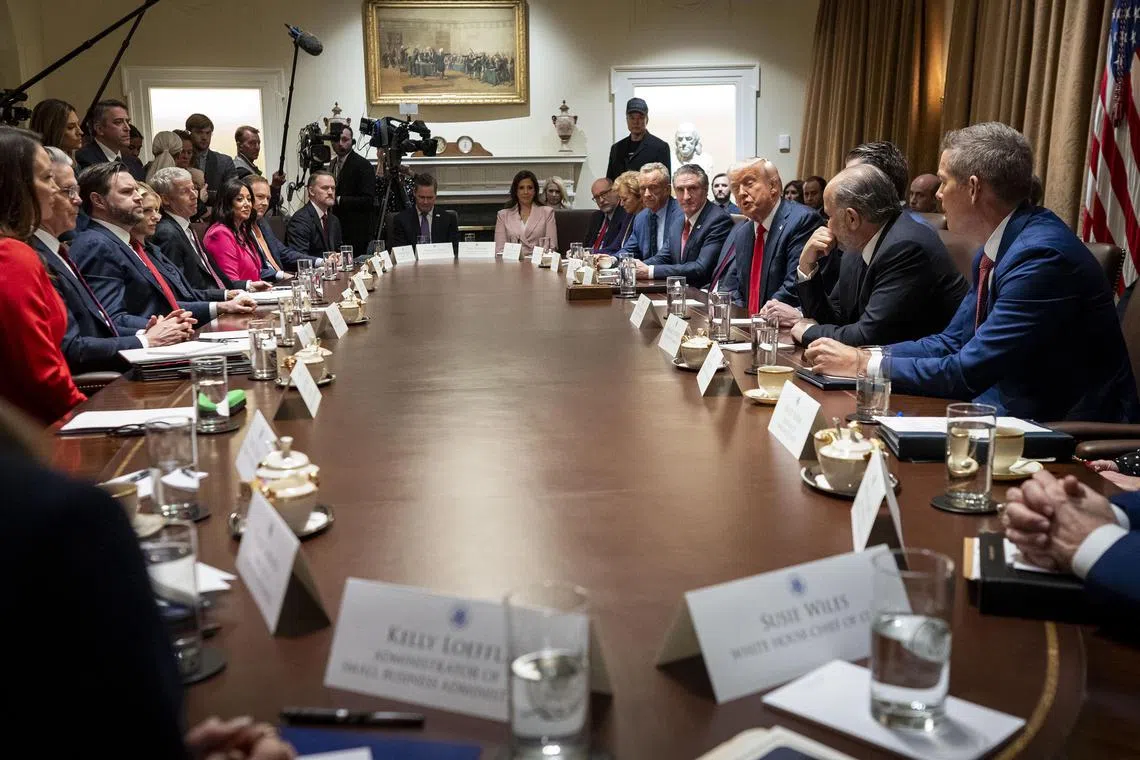Trump orders more layoffs, Musk touts cuts at Cabinet meeting
Sign up now: Get ST's newsletters delivered to your inbox

Mr Elon Musk attending the first Cabinet meeting hosted by US President Donald Trump, in Washington, on Feb 26.
PHOTO: BLOOMBERG
WASHINGTON - US President Donald Trump’s administration on Feb 26 ordered federal agencies to undertake more large-scale layoffs of federal workers, as downsizing czar Elon Musk vowed at Mr Trump’s first Cabinet meeting to pursue deeper spending cuts.
A new administration memo instructed agencies to submit plans by March 13 for a “significant reduction” in staffing to a federal workforce already reeling from Mr Musk’s waves of layoffs and programme cuts. It did not specify numbers of desired layoffs.
The memo, signed by White House budget director Russell Vought and Office of Personnel Management acting head Charles Ezell, represents a major escalation in Mr Trump and Mr Musk’s campaign to slash the size of the US government. Thus far, the layoffs have focused on probationary workers, who have less tenure in their current roles and enjoy fewer job protections. The next round would target the vastly bigger pool of veteran civil servants.
At the Cabinet meeting, Mr Trump said Mr Lee Zeldin, the Environmental Protection Agency administrator, plans to cut up to 65 per cent of his more than 15,000 employees. On Feb 25, an Interior Department source told Reuters that bureaus such as the US Fish and Wildlife Service and the Bureau of Indian Affairs should prepare for workforce cuts ranging from 10 per cent to 40 per cent.
Some 100,000 of the nation’s 2.3 million civilian federal workers have been fired or taken buyouts since Mr Trump took office.
Mr Trump gave Mr Musk an extraordinary sign of support by inviting the billionaire to tout his work to the presidential Cabinet, some of whom had pushed back on his recent demand that all of their employees justify their work or face termination.
Mr Musk is not a Cabinet-level official – and faced no approval by the US Senate – and the White House has claimed in court papers that he is not in charge of the Department of Government Efficiency (Doge), even though Mr Trump has said he is and Mr Musk aides staff Doge.
As Cabinet secretaries looked on, the Tesla and SpaceX chief executive – wearing a black Make America Great Again baseball cap and a T-shirt that read “tech support” – expressed confidence that he can cut the US$6.7 trillion (S$9 trillion) budget by $1 trillion in 2025.
Mr Trump made it clear he backed Mr Musk’s effort, giving him the floor at the top of the meeting and later asking the gathered officials “Is anyone unhappy with Elon?”, to scattered laughs.
Later on Feb 26, Mr Trump signed an executive order directing agencies to work with Doge to review and terminate all “unnecessary” contracts and instructing the General Services Administration (GSA), which manages the government’s real estate, to create a plan for disposing of any unneeded property.
Thus far, Mr Trump and Mr Musk have failed to slow the rate of spending. According to a Reuters analysis, the government spent 13 per cent more during Mr Trump’s first month in office compared with the same time in 2024, largely due to higher debt interest payments and rising health and retirement costs incurred by an ageing population.
Mr Trump reiterated his promise to refrain from cutting popular health and retirement benefits that account for nearly half of the budget, saying: “We are not going to touch it.”
Mr Trump is simultaneously pushing Congress to extend the 2017 tax cuts, the signature legislative accomplishment of his first term, set to expire at the year’s end.
The non-partisan Committee for a Responsible Federal Budget estimates the 2017 cuts added US$2.5 trillion to the nation’s debt – now US$36 trillion.
It estimated that extending the tax cuts could cost more than US$5 trillion over a decade.
Republicans are weighing cuts to healthcare and food aid for the poor to help pay for the tax cuts, though specifics have not yet emerged.
Confusion and threats
Some of the Cabinet secretaries were taken by surprise over the weekend when federal workers received an e-mail requiring them to list their accomplishments for the week, a demand that Mr Musk said would result in termination if ignored. Some agencies told employees to ignore the directive, prompting days of confusion over whether Mr Musk and Mr Trump could make good on the threat.
Mr Musk, the world’s richest person, told the Cabinet meeting his e-mail was an attempt to find out whether government pay cheques were going to actual workers.
“We think there are a number of people on the government payroll who are dead,” he said, without providing evidence.
Mr Trump suggested that the roughly one million workers who did not respond to the e-mail might be at risk of losing their jobs.
Mr Trump and Mr Musk’s unprecedented government overhaul has also frozen foreign aid and disrupted construction projects and scientific research.

President Donald Trump speaking during his first Cabinet meeting on Feb 26.
PHOTO: DOUG MILLS/NYTIMES
In a court filing on Feb 26, the Trump administration said the State Department and the US Agency for International Development had cancelled nearly 10,000 grants and contracts.
The GSA, informally known as the government’s landlord, plans to terminate 1,100 leases for office space by the end of the year, according to a person briefed on the matter.
The terminations will target so-called soft-term leases, which are no longer subject to cancellation penalties and can be easily ended, the person said.
The GSA manages roughly 2,800 soft-term leases in total, and thousands more “firm-term” leases that cannot be ended without cause.
Twenty-one workers resigned from Mr Musk’s Doge
Federal judges have questioned the secrecy of Doge’s activities. REUTERS


